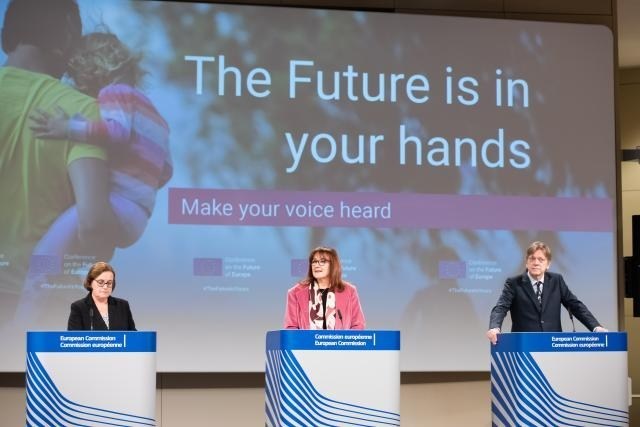Representatives of the three main European institutions, the Parliament, the Council and the Commission, launched on Monday the digital platform for the conference, due to get formally started on Europe day, 9 May, marking the anniversary of the Schuman declaration.
By coincidence, the launch occurred 70 years after the historical signature on 18 April 1951 of the Treaty of Paris, establishing the European Coal and Steel Community, which would pave the way for the European Communities and later the European Union.
The launch followed the joint declaration on the Conference of the Future of Europe by the three institutions. In the declaration, the European institutions committed themselves to engage with citizens for democracy and building a more resilient Europe. The Conference is described as a citizen focused and bottom-up exercise for Europeans to have their way on what they expect from the EU.
The platform is multilingual and available in 24 languages, allowing citizens from across the EU to keep themselves updated about the conference, to share and exchange their ideas and views, and to organised events. On the platform, anyone can browse the ideas submitted and event outcomes.
In order to be able to contribute, participants need to create an EU login account and register or log in via social media.
MEP Guy Verhofstadt, the Parliament’s co-chair of the conference, described the interactive platform as a totally new instrument in EU’s history. It will allow citizens to participate both passively and actively in the conference. The platform will serve as the engine of the conference and its output will form the input to next phase of the conference, the citizens panels and plenary sessions.
Participants will be bound by a charter not to abuse the platform by disseminating fake news and hate speech. The publication of contents will be subject to moderation posteriori by a team of moderators and any content that does not comply with the charter will be flagged and not allowed. The Commission promises that the moderation will be both proactive and reactive.
“The risk of foreign interference, fake news, or even interest groups, political parties, churches or others impacting disproportionately on the platform can be countered technically,” commented Bent Noerby Bonde, Secretary General of Europe's People's Forum, which represents technical partners and civil society organisations all over Europe.
The digital platform lists 10 topics, including “Other issues”. What about ideas about treaty changes?
Dubravka Sucia, the European Commissioner leading the work on deliberative democracy and the Conference on the Future of Europe, assured that no topic is exempted. Verhofstadt admitted that treaty change is not mentioned as a separate topic in the joint declaration, which implies that “everything is possible, nothing is impossible” to discuss.
The costs of the conference are shared by all three institutions but no budget figure was given at the press conference and it was not clear how the funding will function. National parliaments are supposed to pay for national events and events organised by local and regional organisations. Events organised by civil society organisations might get some funding from the common budget of the conference.
Europe’s People´s Forum, one of the first expert organisation that advised the EU institutions to use an online digital platform to engage as many citizens as possible during the conference, is now calling for the creation of a permanent mechanism of citizens consultation and participation.
The purpose would be to increase citizens’ sense of ownership over the EU’s strategic direction and to give citizens’ a clear sense that the European project reflects their needs and aspirations.
The Forum has proposed an independent foundation which could be set up by the European Parliament to implement and gradually refine a range of instruments of democratic participation.
The Conference on the Future of Europe will end by Spring 2022. Is the digital platform a temporary instrument for the conference or will it become a permanent feature of participative democracy? Vice-President Sucia replied that an extension is possible but no decision on this has been taken yet.
M. Apelblat
The Brussels Times

